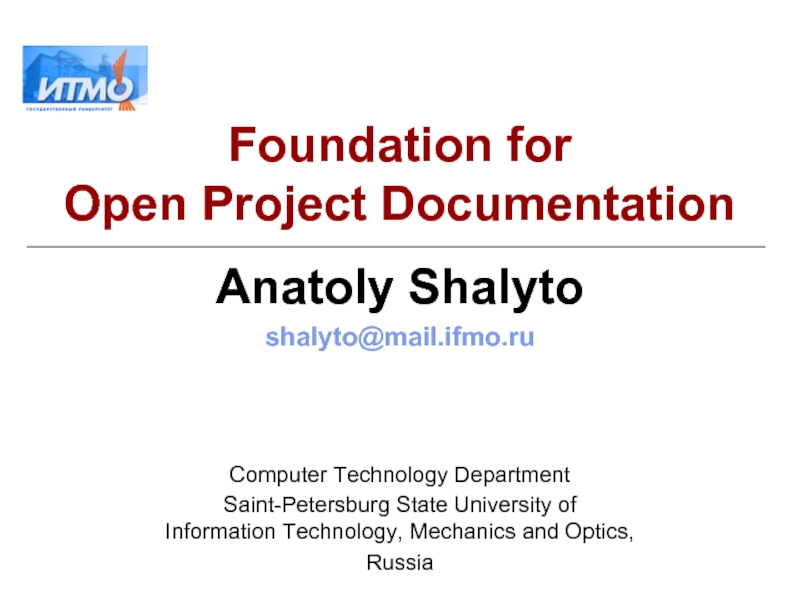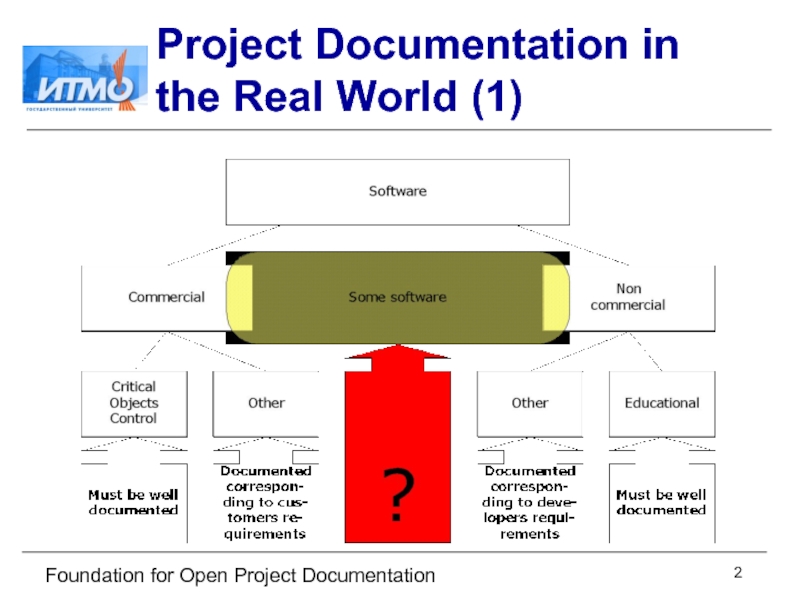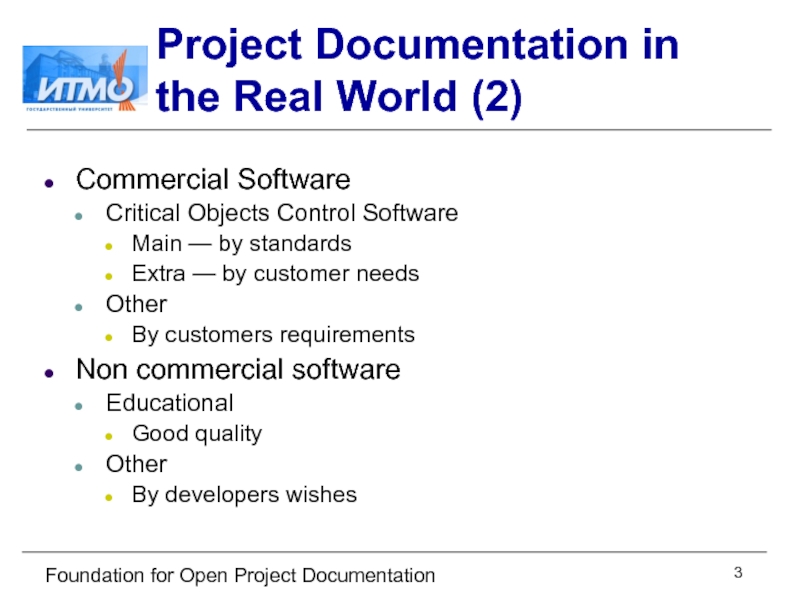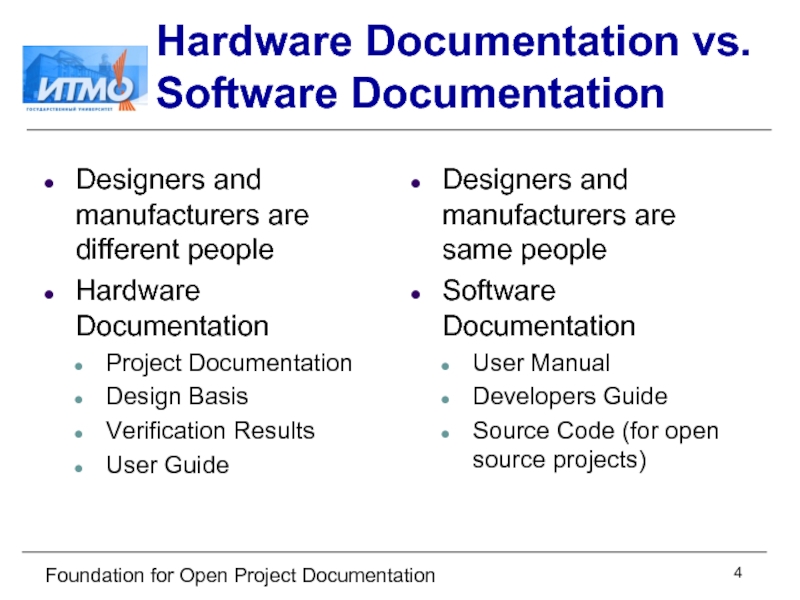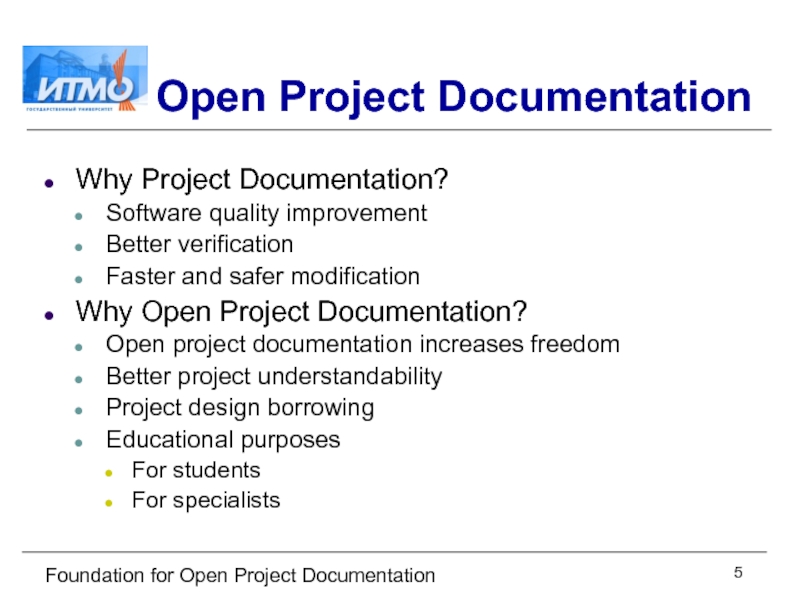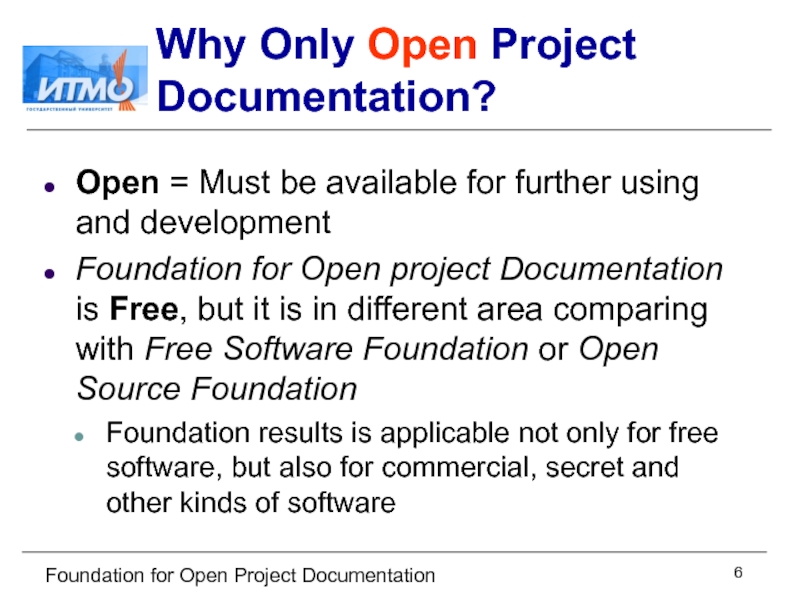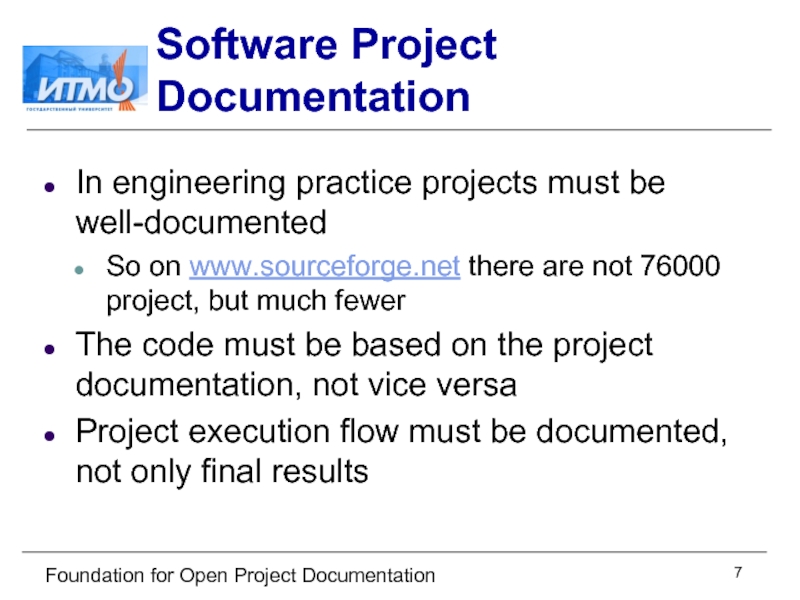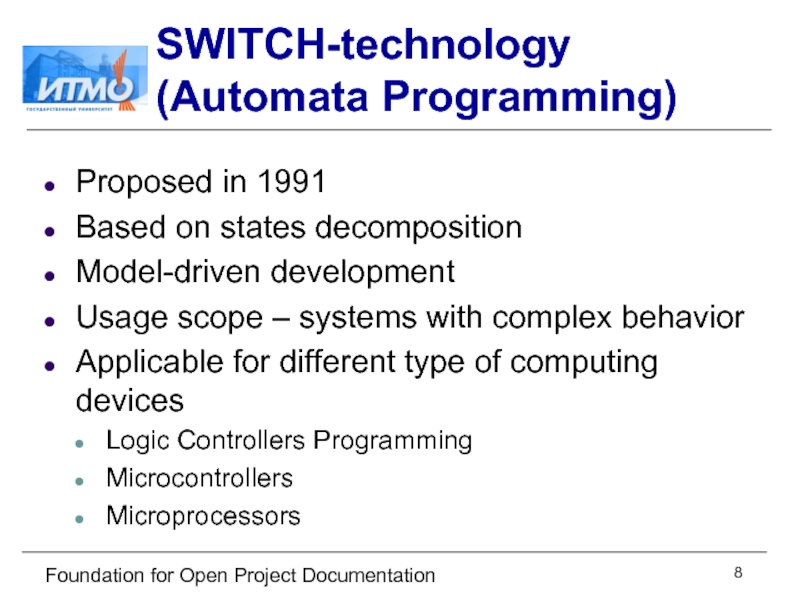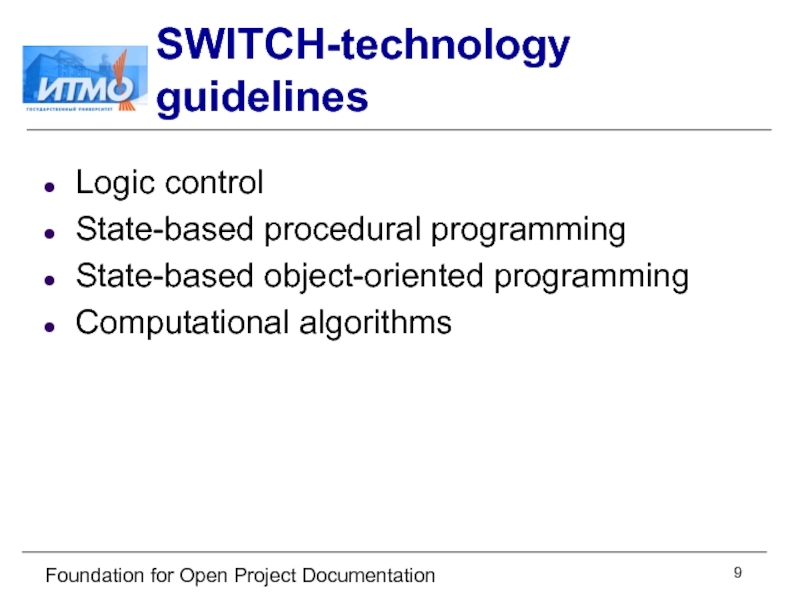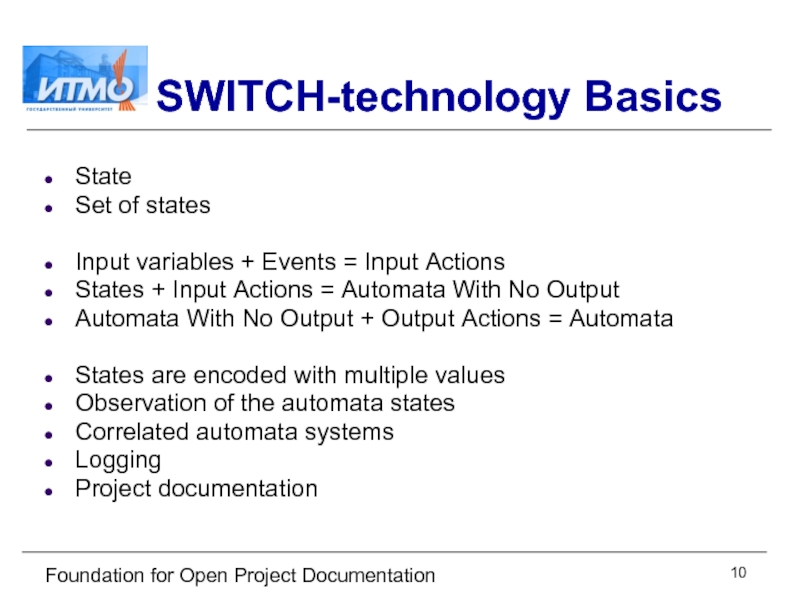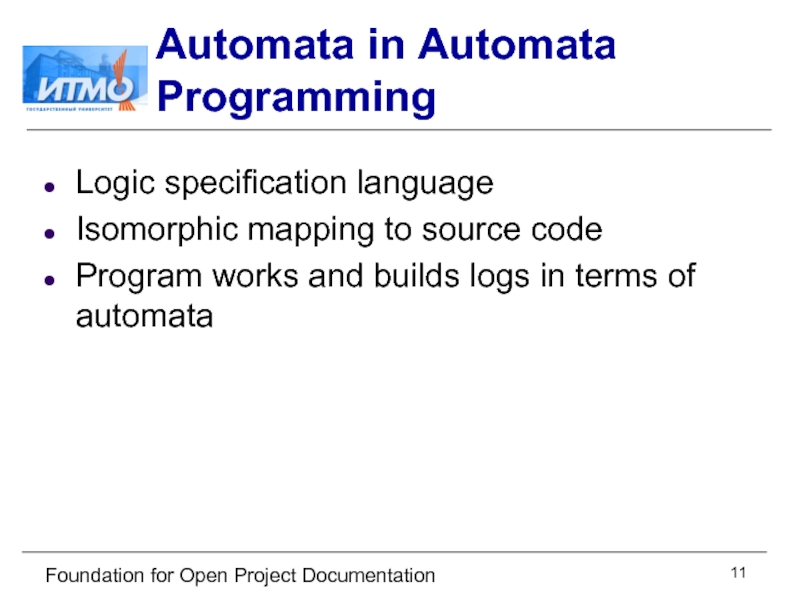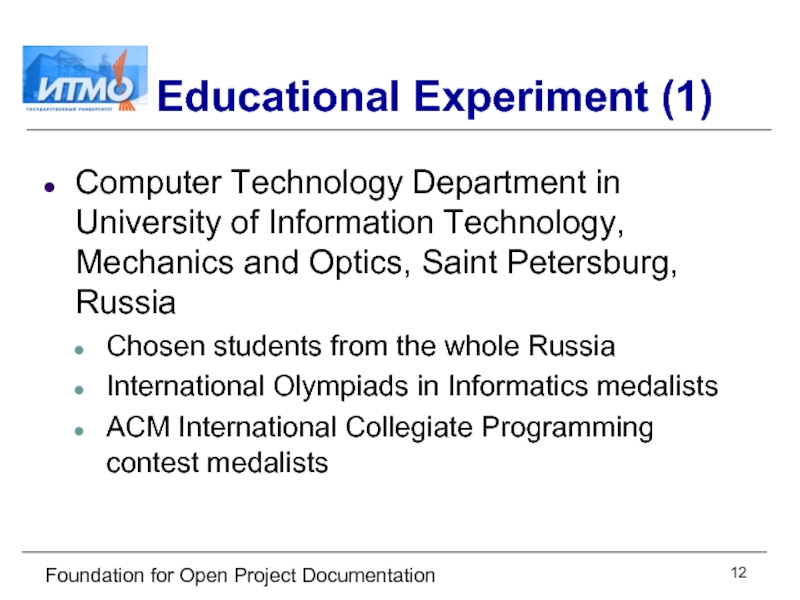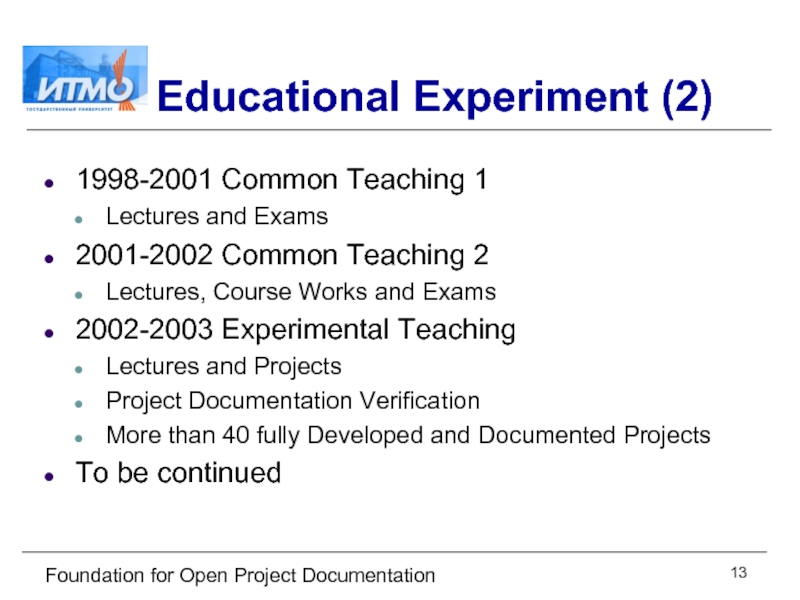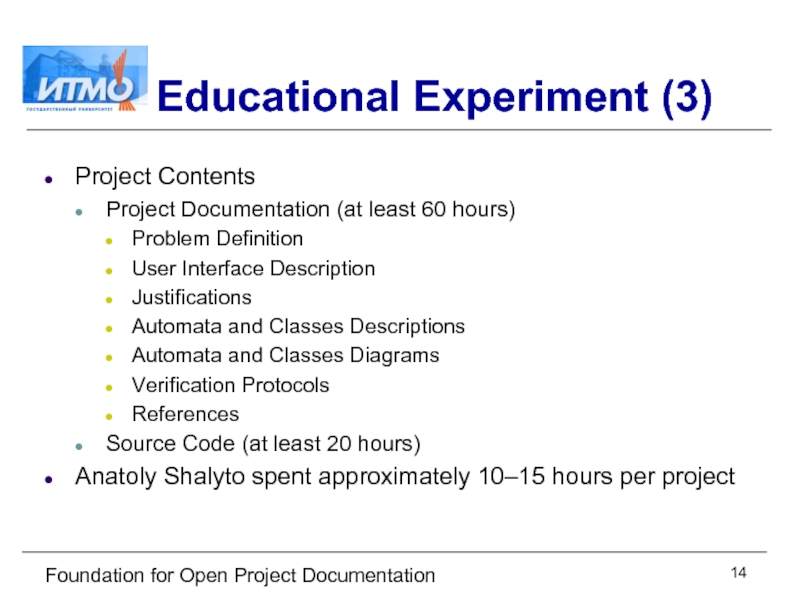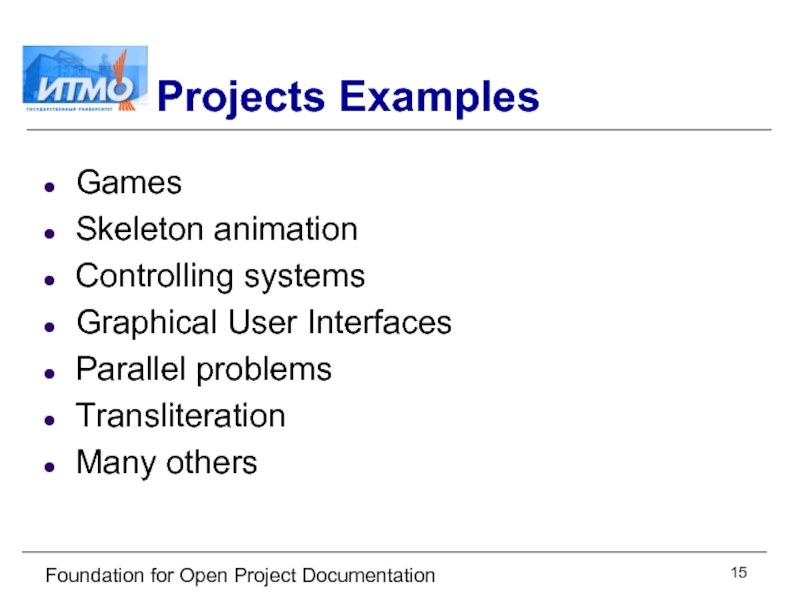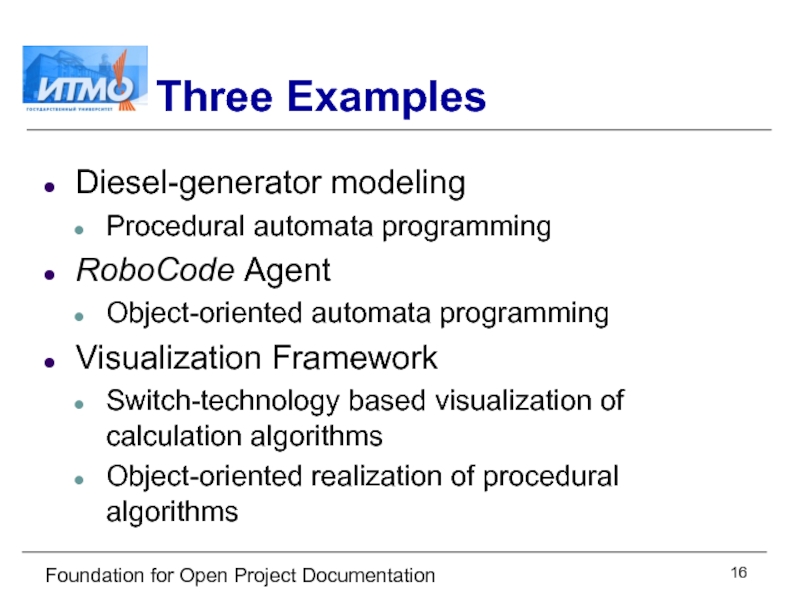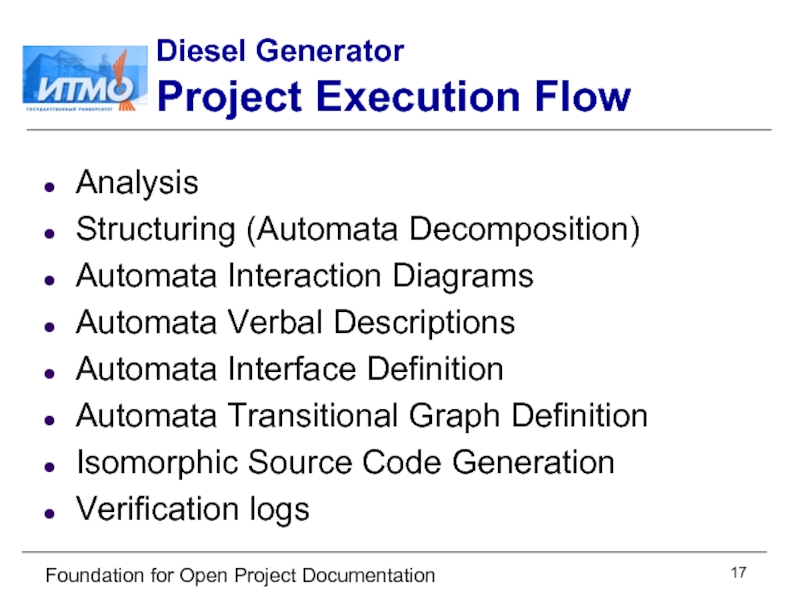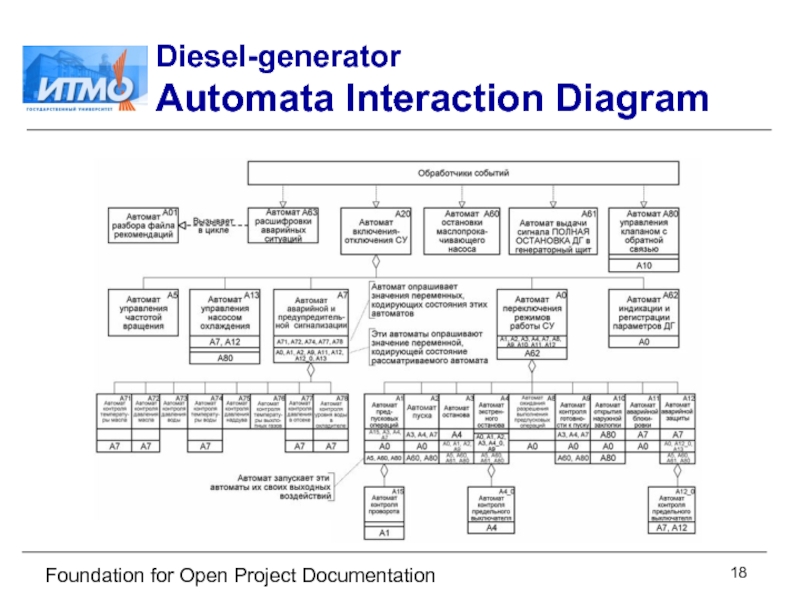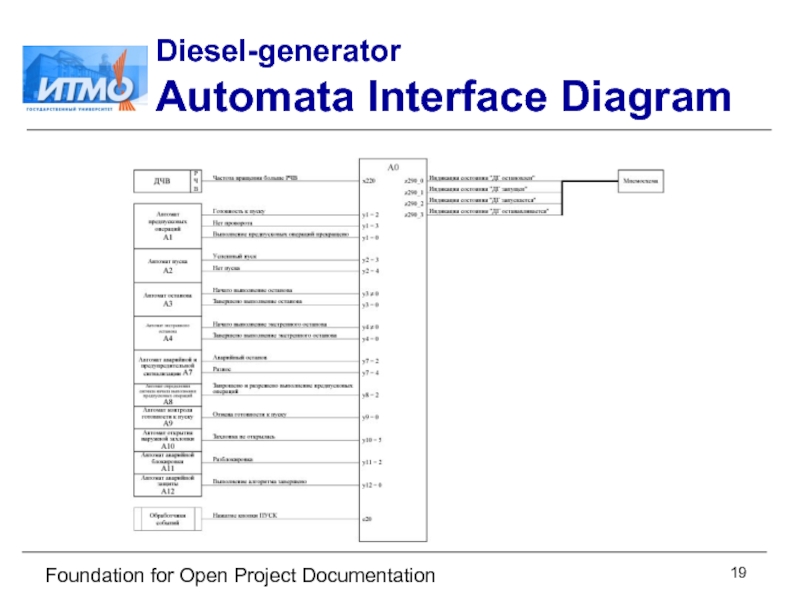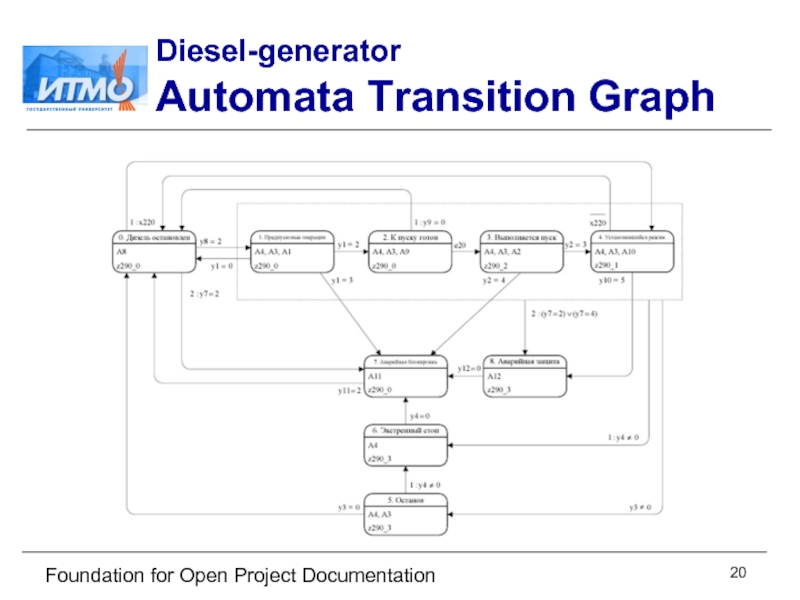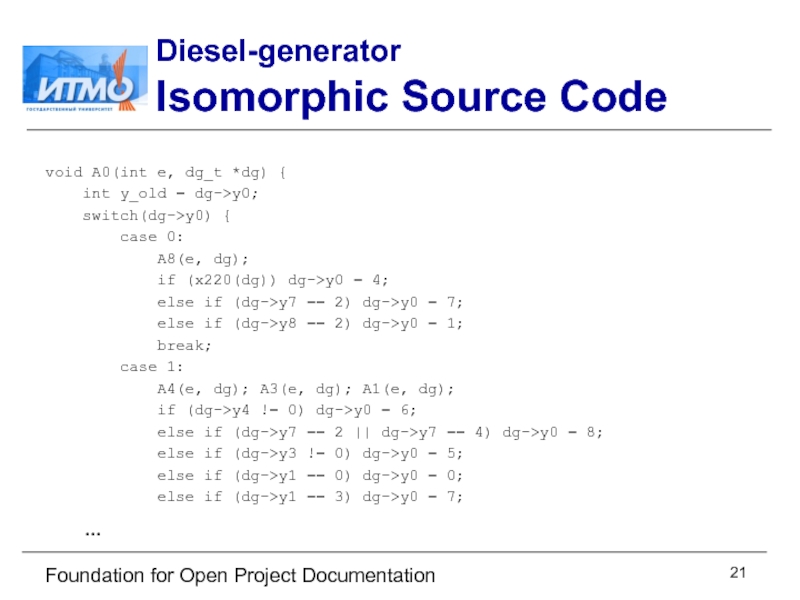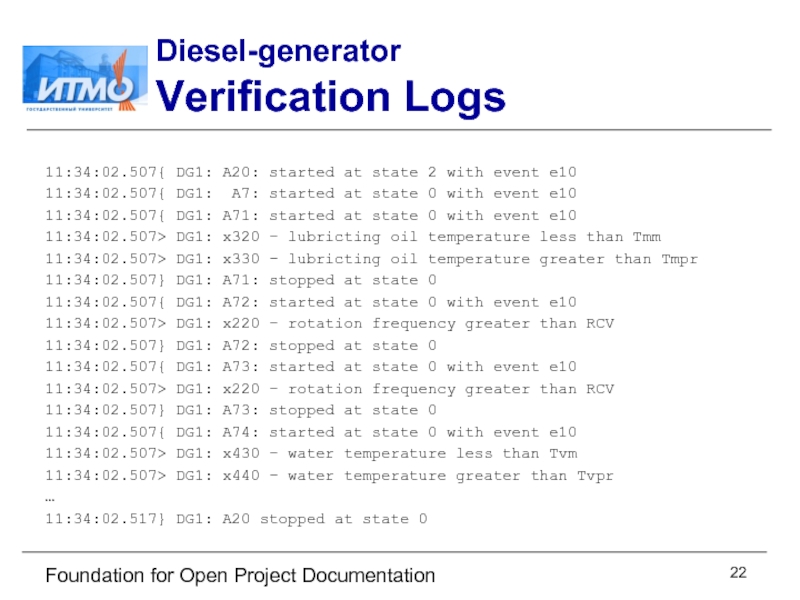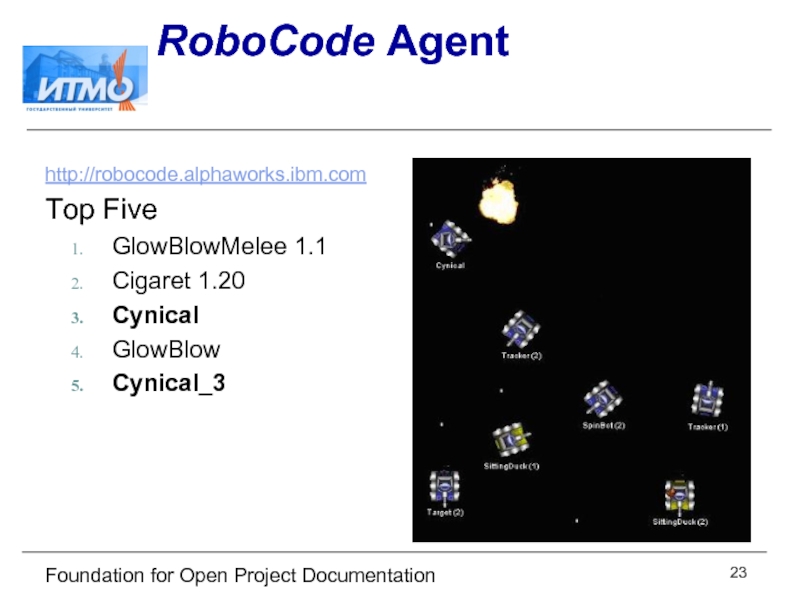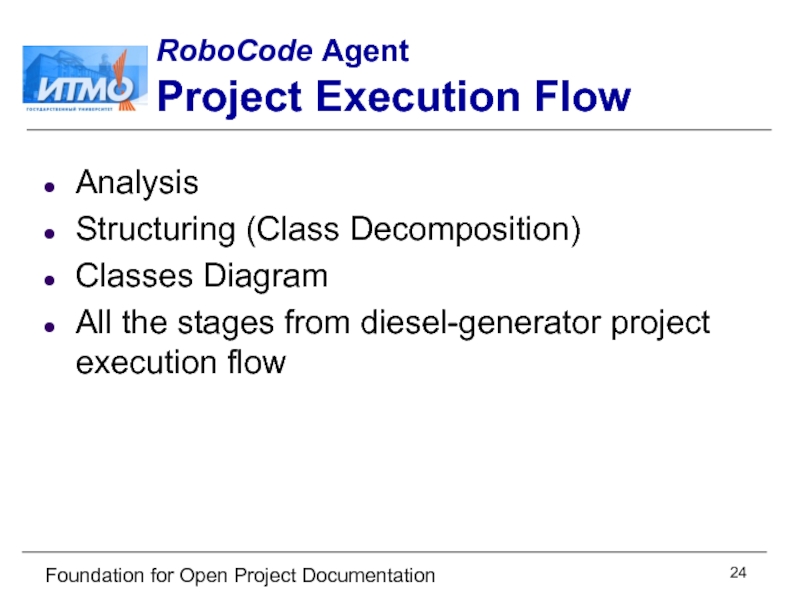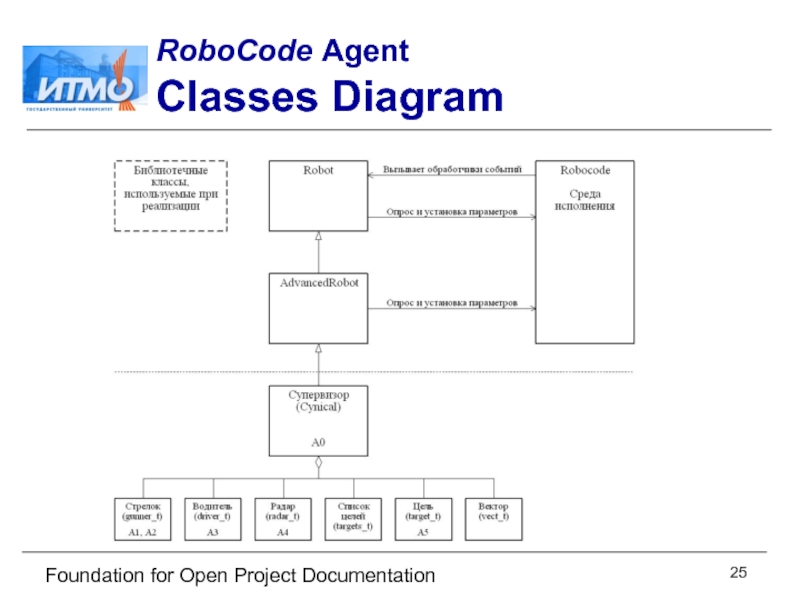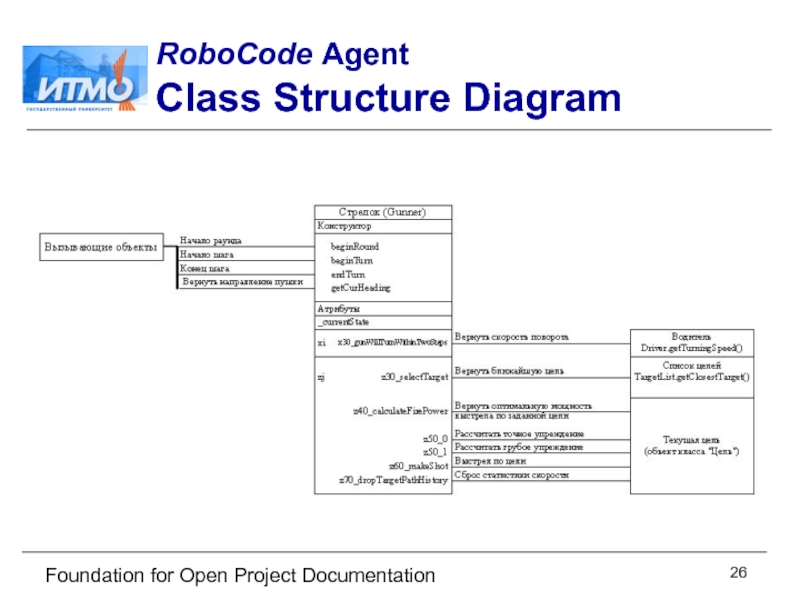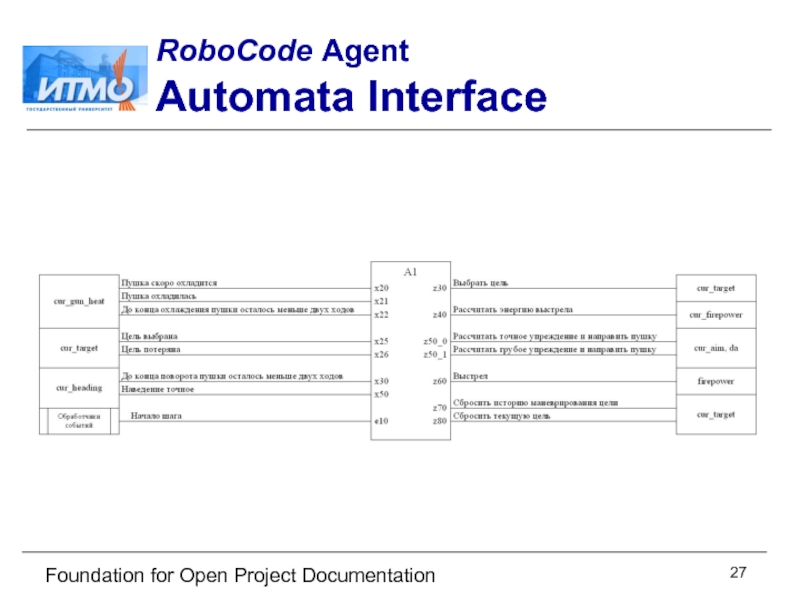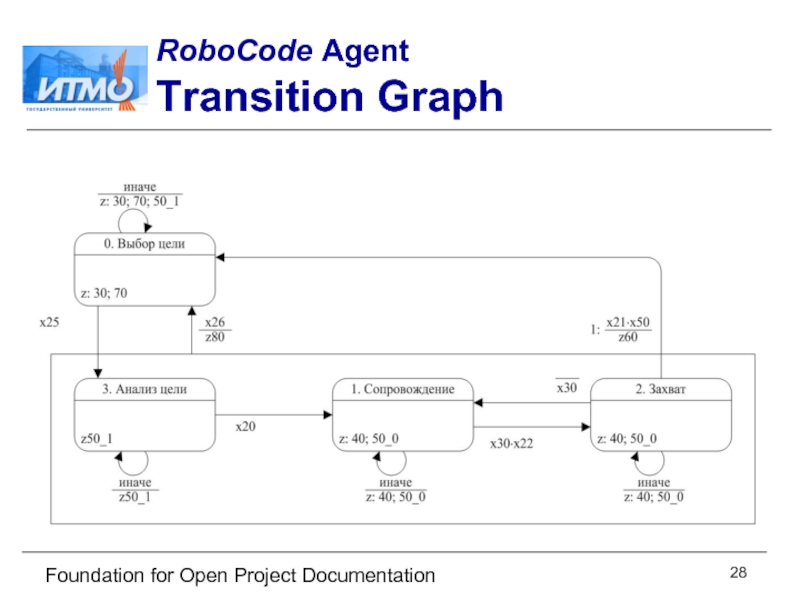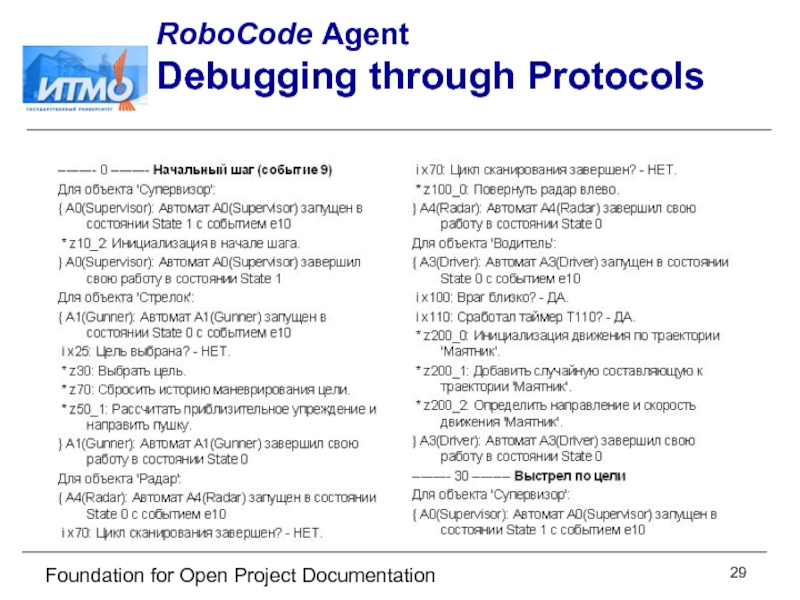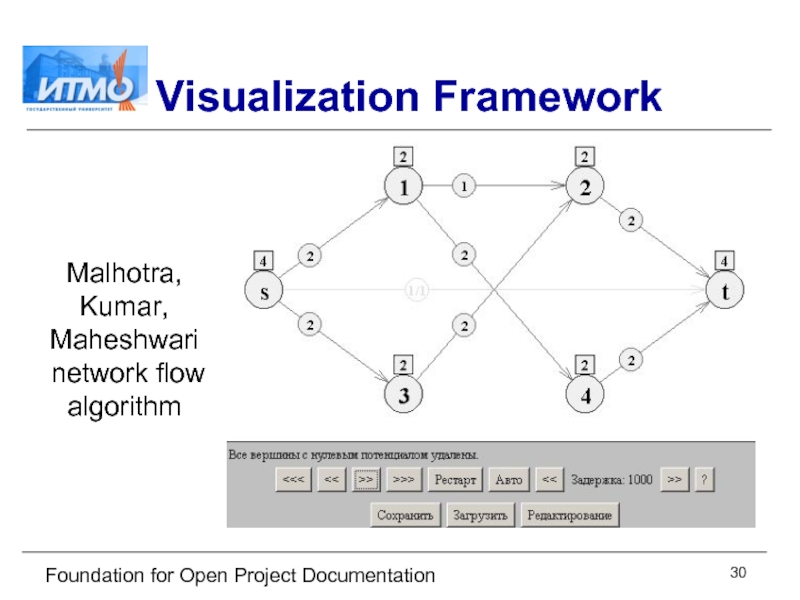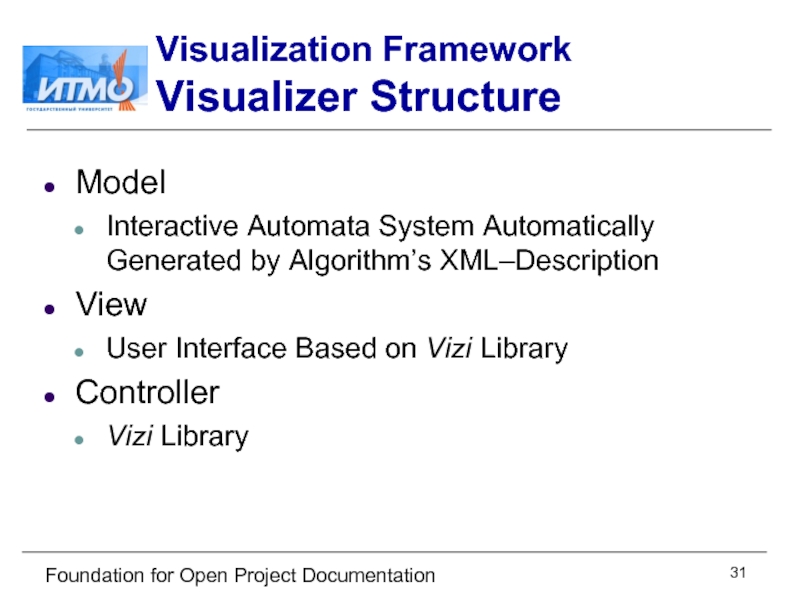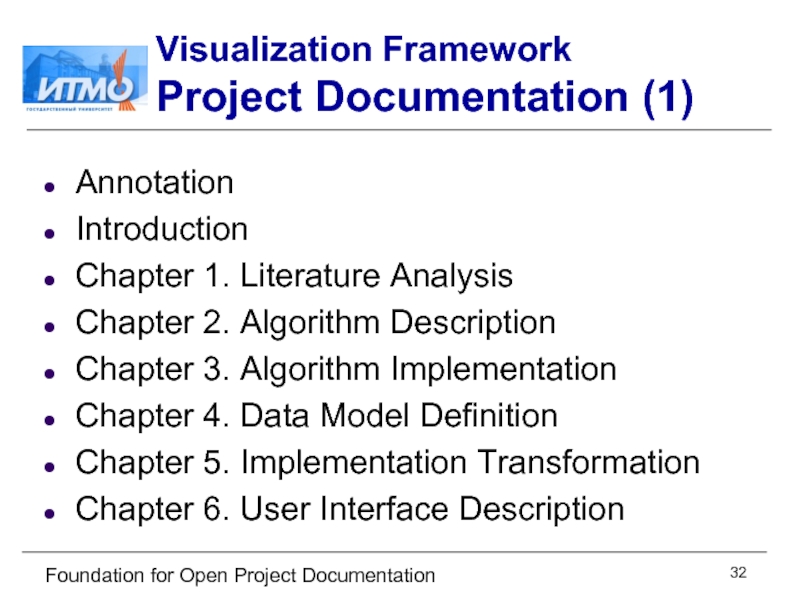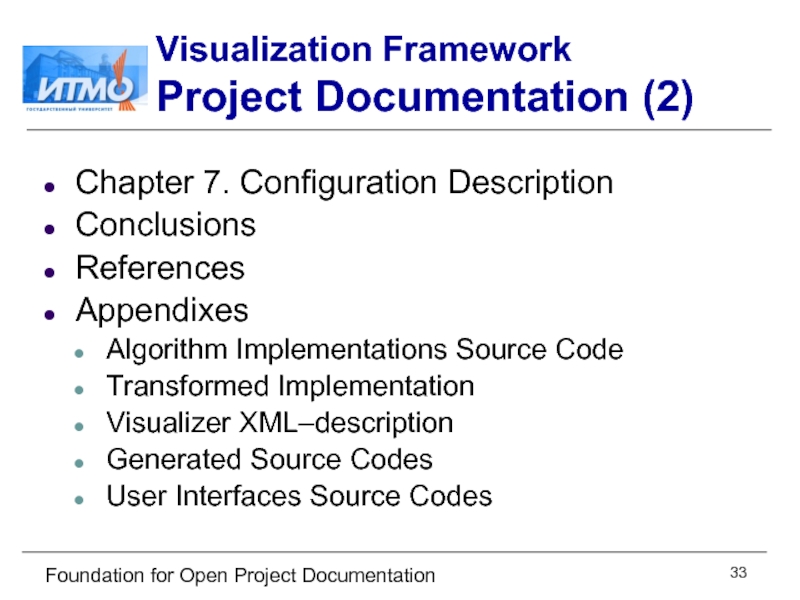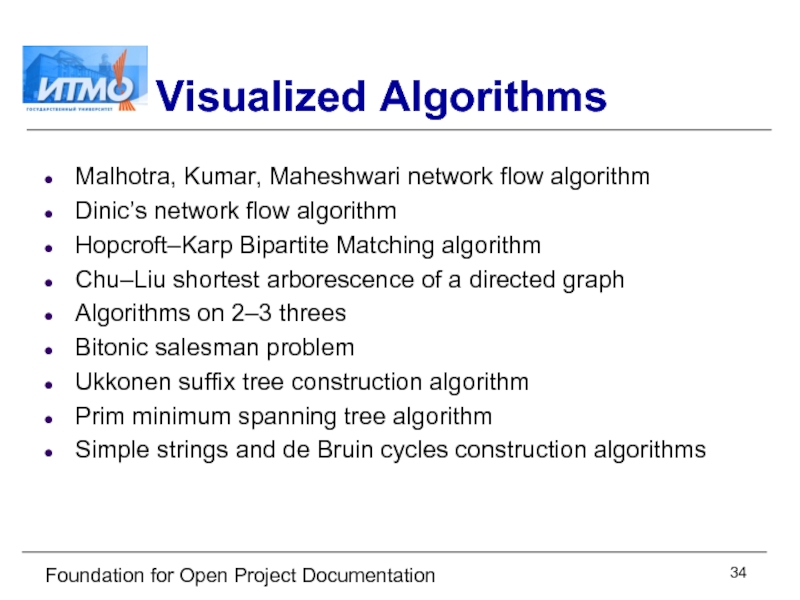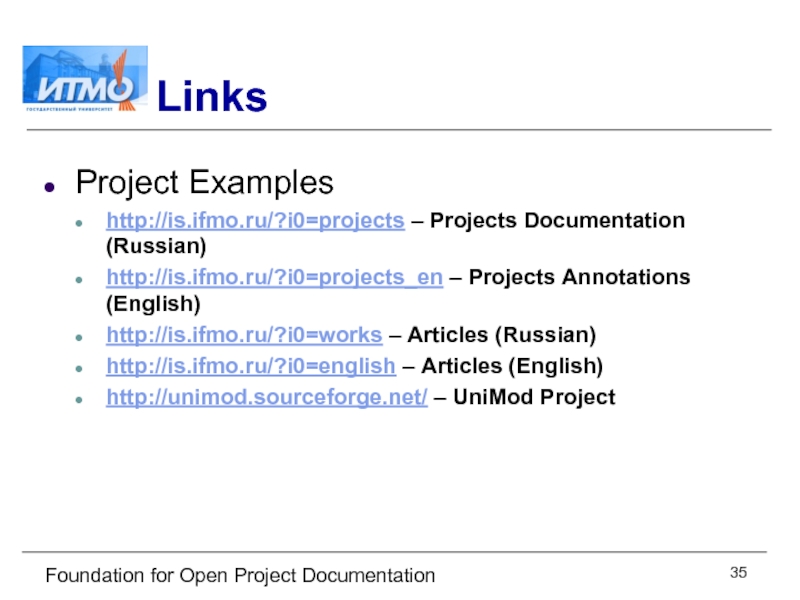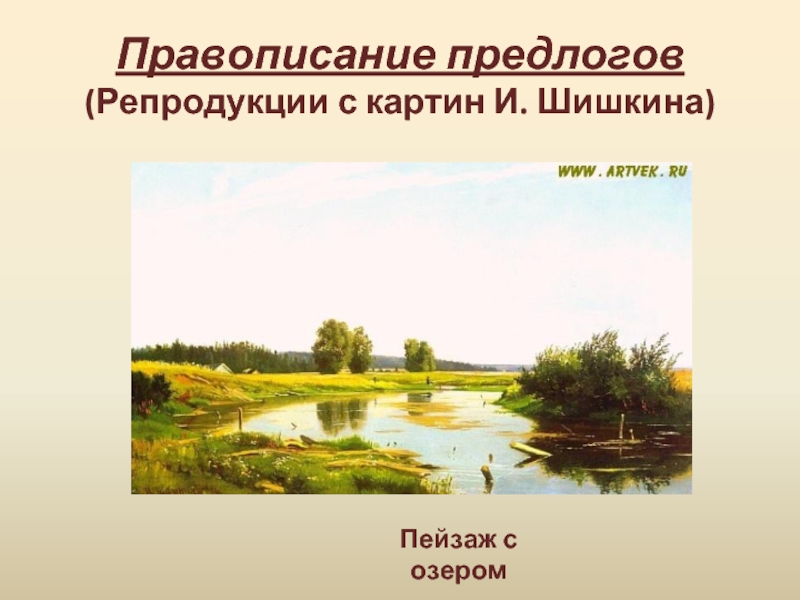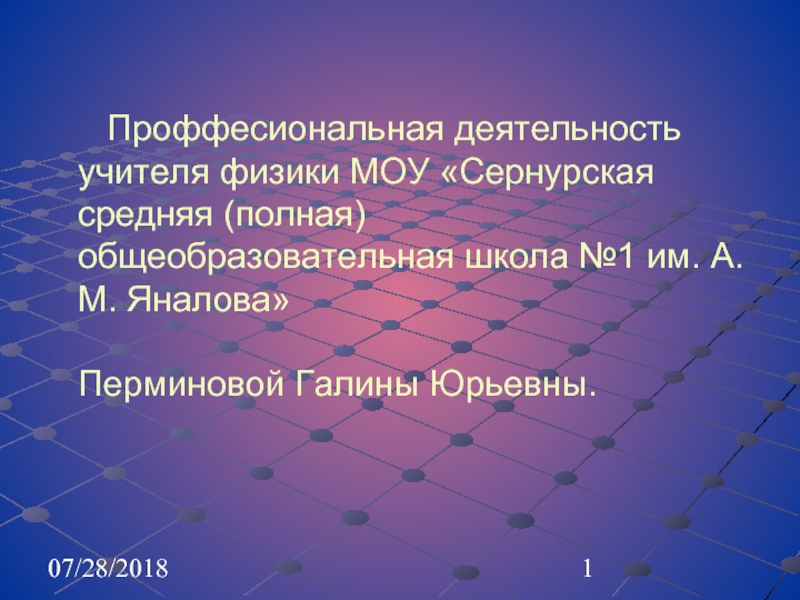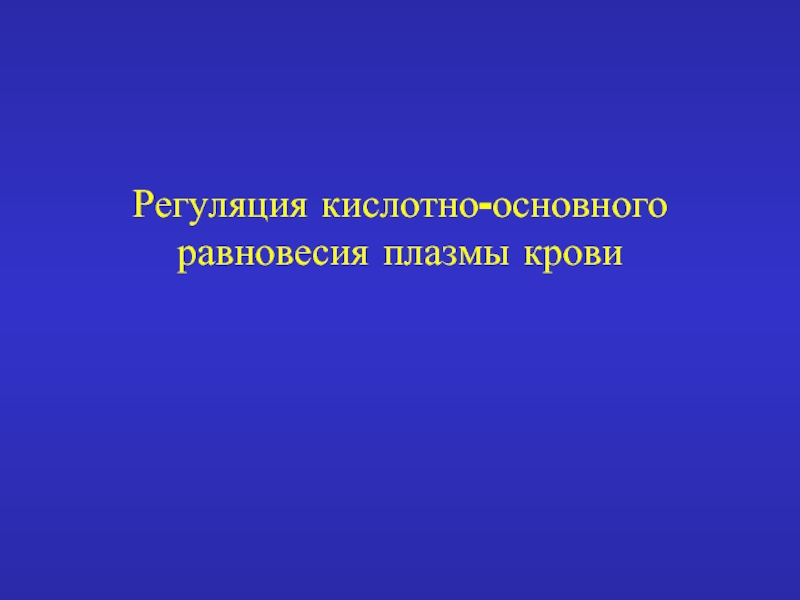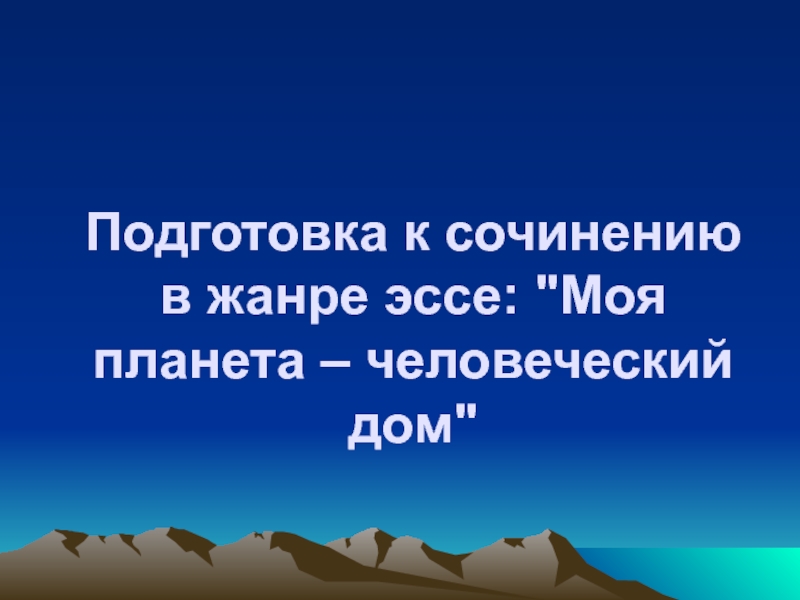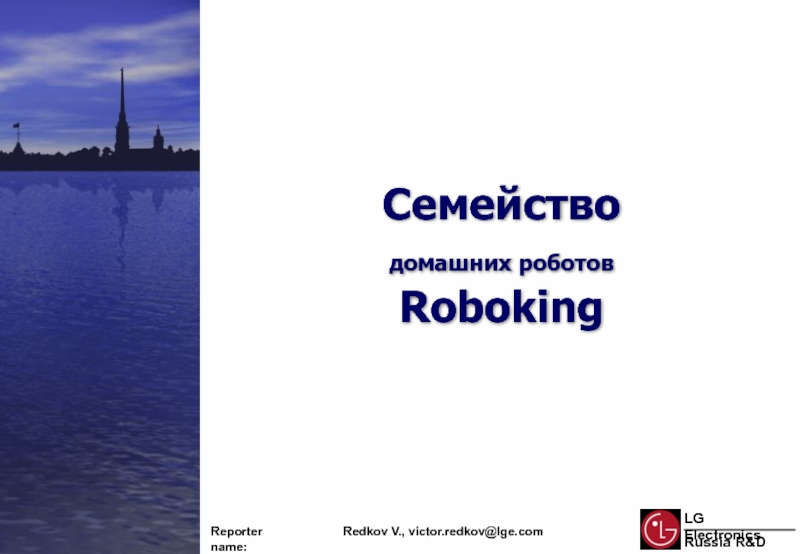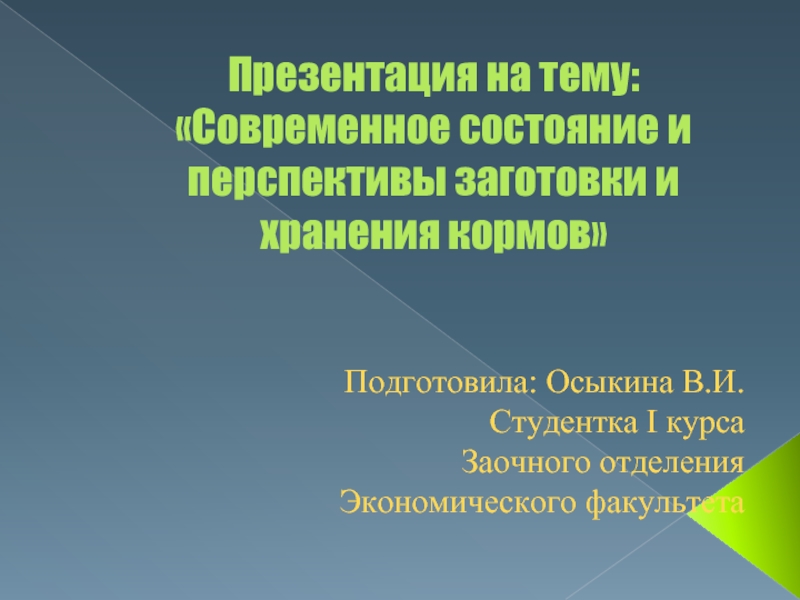Technology, Mechanics and Optics,
Russia
- Главная
- Разное
- Дизайн
- Бизнес и предпринимательство
- Аналитика
- Образование
- Развлечения
- Красота и здоровье
- Финансы
- Государство
- Путешествия
- Спорт
- Недвижимость
- Армия
- Графика
- Культурология
- Еда и кулинария
- Лингвистика
- Английский язык
- Астрономия
- Алгебра
- Биология
- География
- Детские презентации
- Информатика
- История
- Литература
- Маркетинг
- Математика
- Медицина
- Менеджмент
- Музыка
- МХК
- Немецкий язык
- ОБЖ
- Обществознание
- Окружающий мир
- Педагогика
- Русский язык
- Технология
- Физика
- Философия
- Химия
- Шаблоны, картинки для презентаций
- Экология
- Экономика
- Юриспруденция
Foundation for Open Project Documentation презентация
Содержание
- 1. Foundation for Open Project Documentation
- 2. Foundation for Open Project Documentation Project Documentation in the Real World (1)
- 3. Foundation for Open Project Documentation Project Documentation
- 4. Foundation for Open Project Documentation Hardware Documentation
- 5. Foundation for Open Project Documentation Open Project
- 6. Foundation for Open Project Documentation Why Only
- 7. Foundation for Open Project Documentation Software Project
- 8. Foundation for Open Project Documentation SWITCH-technology (Automata
- 9. Foundation for Open Project Documentation SWITCH-technology guidelines
- 10. Foundation for Open Project Documentation SWITCH-technology Basics
- 11. Foundation for Open Project Documentation Automata in
- 12. Foundation for Open Project Documentation Educational Experiment
- 13. Foundation for Open Project Documentation Educational Experiment
- 14. Foundation for Open Project Documentation Educational Experiment
- 15. Foundation for Open Project Documentation Projects Examples
- 16. Foundation for Open Project Documentation Three Examples
- 17. Foundation for Open Project Documentation Diesel Generator
- 18. Foundation for Open Project Documentation Diesel-generator Automata Interaction Diagram
- 19. Foundation for Open Project Documentation Diesel-generator Automata Interface Diagram
- 20. Foundation for Open Project Documentation Diesel-generator Automata Transition Graph
- 21. Foundation for Open Project Documentation Diesel-generator Isomorphic
- 22. Foundation for Open Project Documentation Diesel-generator Verification
- 23. Foundation for Open Project Documentation RoboCode Agent
- 24. Foundation for Open Project Documentation RoboCode Agent
- 25. Foundation for Open Project Documentation RoboCode Agent Classes Diagram
- 26. Foundation for Open Project Documentation RoboCode Agent Class Structure Diagram
- 27. Foundation for Open Project Documentation RoboCode Agent Automata Interface
- 28. Foundation for Open Project Documentation RoboCode Agent Transition Graph
- 29. Foundation for Open Project Documentation RoboCode Agent Debugging through Protocols
- 30. Foundation for Open Project Documentation Visualization Framework Malhotra, Kumar, Maheshwari network flow algorithm
- 31. Foundation for Open Project Documentation Visualization
- 32. Foundation for Open Project Documentation Visualization Framework
- 33. Foundation for Open Project Documentation Visualization Framework
- 34. Foundation for Open Project Documentation Visualized Algorithms
- 35. Foundation for Open Project Documentation Links Project
Слайд 1Foundation for
Open Project Documentation
Anatoly Shalyto
shalyto@mail.ifmo.ru
Computer Technology Department
Saint-Petersburg State University of
Information
Слайд 3Foundation for Open Project Documentation
Project Documentation in
the Real World (2)
Commercial
Software
Critical Objects Control Software
Main — by standards
Extra — by customer needs
Other
By customers requirements
Non commercial software
Educational
Good quality
Other
By developers wishes
Critical Objects Control Software
Main — by standards
Extra — by customer needs
Other
By customers requirements
Non commercial software
Educational
Good quality
Other
By developers wishes
Слайд 4Foundation for Open Project Documentation
Hardware Documentation vs. Software Documentation
Designers and manufacturers
are different people
Hardware Documentation
Project Documentation
Design Basis
Verification Results
User Guide
Hardware Documentation
Project Documentation
Design Basis
Verification Results
User Guide
Designers and manufacturers are same people
Software Documentation
User Manual
Developers Guide
Source Code (for open source projects)
Слайд 5Foundation for Open Project Documentation
Open Project Documentation
Why Project Documentation?
Software quality improvement
Better
verification
Faster and safer modification
Why Open Project Documentation?
Open project documentation increases freedom
Better project understandability
Project design borrowing
Educational purposes
For students
For specialists
Faster and safer modification
Why Open Project Documentation?
Open project documentation increases freedom
Better project understandability
Project design borrowing
Educational purposes
For students
For specialists
Слайд 6Foundation for Open Project Documentation
Why Only Open Project Documentation?
Open = Must
be available for further using and development
Foundation for Open project Documentation is Free, but it is in different area comparing with Free Software Foundation or Open Source Foundation
Foundation results is applicable not only for free software, but also for commercial, secret and other kinds of software
Foundation for Open project Documentation is Free, but it is in different area comparing with Free Software Foundation or Open Source Foundation
Foundation results is applicable not only for free software, but also for commercial, secret and other kinds of software
Слайд 7Foundation for Open Project Documentation
Software Project Documentation
In engineering practice projects must
be well-documented
So on www.sourceforge.net there are not 76000 project, but much fewer
The code must be based on the project documentation, not vice versa
Project execution flow must be documented, not only final results
So on www.sourceforge.net there are not 76000 project, but much fewer
The code must be based on the project documentation, not vice versa
Project execution flow must be documented, not only final results
Слайд 8Foundation for Open Project Documentation
SWITCH-technology (Automata Programming)
Proposed in 1991
Based on states
decomposition
Model-driven development
Usage scope – systems with complex behavior
Applicable for different type of computing devices
Logic Controllers Programming
Microcontrollers
Microprocessors
Model-driven development
Usage scope – systems with complex behavior
Applicable for different type of computing devices
Logic Controllers Programming
Microcontrollers
Microprocessors
Слайд 9Foundation for Open Project Documentation
SWITCH-technology guidelines
Logic control
State-based procedural programming
State-based object-oriented
programming
Computational algorithms
Computational algorithms
Слайд 10Foundation for Open Project Documentation
SWITCH-technology Basics
State
Set of states
Input variables + Events
= Input Actions
States + Input Actions = Automata With No Output
Automata With No Output + Output Actions = Automata
States are encoded with multiple values
Observation of the automata states
Correlated automata systems
Logging
Project documentation
States + Input Actions = Automata With No Output
Automata With No Output + Output Actions = Automata
States are encoded with multiple values
Observation of the automata states
Correlated automata systems
Logging
Project documentation
Слайд 11Foundation for Open Project Documentation
Automata in Automata Programming
Logic specification language
Isomorphic mapping
to source code
Program works and builds logs in terms of automata
Program works and builds logs in terms of automata
Слайд 12Foundation for Open Project Documentation
Educational Experiment (1)
Computer Technology Department in University
of Information Technology, Mechanics and Optics, Saint Petersburg, Russia
Chosen students from the whole Russia
International Olympiads in Informatics medalists
ACM International Collegiate Programming contest medalists
Chosen students from the whole Russia
International Olympiads in Informatics medalists
ACM International Collegiate Programming contest medalists
Слайд 13Foundation for Open Project Documentation
Educational Experiment (2)
1998-2001 Common Teaching 1
Lectures and
Exams
2001-2002 Common Teaching 2
Lectures, Course Works and Exams
2002-2003 Experimental Teaching
Lectures and Projects
Project Documentation Verification
More than 40 fully Developed and Documented Projects
To be continued
2001-2002 Common Teaching 2
Lectures, Course Works and Exams
2002-2003 Experimental Teaching
Lectures and Projects
Project Documentation Verification
More than 40 fully Developed and Documented Projects
To be continued
Слайд 14Foundation for Open Project Documentation
Educational Experiment (3)
Project Contents
Project Documentation (at least
60 hours)
Problem Definition
User Interface Description
Justifications
Automata and Classes Descriptions
Automata and Classes Diagrams
Verification Protocols
References
Source Code (at least 20 hours)
Anatoly Shalyto spent approximately 10–15 hours per project
Problem Definition
User Interface Description
Justifications
Automata and Classes Descriptions
Automata and Classes Diagrams
Verification Protocols
References
Source Code (at least 20 hours)
Anatoly Shalyto spent approximately 10–15 hours per project
Слайд 15Foundation for Open Project Documentation
Projects Examples
Games
Skeleton animation
Controlling systems
Graphical User
Interfaces
Parallel problems
Transliteration
Many others
Parallel problems
Transliteration
Many others
Слайд 16Foundation for Open Project Documentation
Three Examples
Diesel-generator modeling
Procedural automata programming
RoboCode Agent
Object-oriented automata
programming
Visualization Framework
Switch-technology based visualization of calculation algorithms
Object-oriented realization of procedural algorithms
Visualization Framework
Switch-technology based visualization of calculation algorithms
Object-oriented realization of procedural algorithms
Слайд 17Foundation for Open Project Documentation
Diesel Generator
Project Execution Flow
Analysis
Structuring (Automata Decomposition)
Automata
Interaction Diagrams
Automata Verbal Descriptions
Automata Interface Definition
Automata Transitional Graph Definition
Isomorphic Source Code Generation
Verification logs
Automata Verbal Descriptions
Automata Interface Definition
Automata Transitional Graph Definition
Isomorphic Source Code Generation
Verification logs
Слайд 21Foundation for Open Project Documentation
Diesel-generator
Isomorphic Source Code
void A0(int e, dg_t *dg)
{
int y_old = dg->y0;
switch(dg->y0) {
case 0:
A8(e, dg);
if (x220(dg)) dg->y0 = 4;
else if (dg->y7 == 2) dg->y0 = 7;
else if (dg->y8 == 2) dg->y0 = 1;
break;
case 1:
A4(e, dg); A3(e, dg); A1(e, dg);
if (dg->y4 != 0) dg->y0 = 6;
else if (dg->y7 == 2 || dg->y7 == 4) dg->y0 = 8;
else if (dg->y3 != 0) dg->y0 = 5;
else if (dg->y1 == 0) dg->y0 = 0;
else if (dg->y1 == 3) dg->y0 = 7;
…
int y_old = dg->y0;
switch(dg->y0) {
case 0:
A8(e, dg);
if (x220(dg)) dg->y0 = 4;
else if (dg->y7 == 2) dg->y0 = 7;
else if (dg->y8 == 2) dg->y0 = 1;
break;
case 1:
A4(e, dg); A3(e, dg); A1(e, dg);
if (dg->y4 != 0) dg->y0 = 6;
else if (dg->y7 == 2 || dg->y7 == 4) dg->y0 = 8;
else if (dg->y3 != 0) dg->y0 = 5;
else if (dg->y1 == 0) dg->y0 = 0;
else if (dg->y1 == 3) dg->y0 = 7;
…
Слайд 22Foundation for Open Project Documentation
Diesel-generator
Verification Logs
11:34:02.507{ DG1: A20: started at state
2 with event e10
11:34:02.507{ DG1: A7: started at state 0 with event e10
11:34:02.507{ DG1: A71: started at state 0 with event e10
11:34:02.507> DG1: x320 – lubricting oil temperature less than Tmm
11:34:02.507> DG1: x330 - lubricting oil temperature greater than Tmpr
11:34:02.507} DG1: A71: stopped at state 0
11:34:02.507{ DG1: A72: started at state 0 with event e10
11:34:02.507> DG1: x220 – rotation frequency greater than RCV
11:34:02.507} DG1: A72: stopped at state 0
11:34:02.507{ DG1: A73: started at state 0 with event e10
11:34:02.507> DG1: x220 – rotation frequency greater than RCV
11:34:02.507} DG1: A73: stopped at state 0
11:34:02.507{ DG1: A74: started at state 0 with event e10
11:34:02.507> DG1: x430 – water temperature less than Tvm
11:34:02.507> DG1: x440 - water temperature greater than Tvpr
…
11:34:02.517} DG1: A20 stopped at state 0
11:34:02.507{ DG1: A7: started at state 0 with event e10
11:34:02.507{ DG1: A71: started at state 0 with event e10
11:34:02.507> DG1: x320 – lubricting oil temperature less than Tmm
11:34:02.507> DG1: x330 - lubricting oil temperature greater than Tmpr
11:34:02.507} DG1: A71: stopped at state 0
11:34:02.507{ DG1: A72: started at state 0 with event e10
11:34:02.507> DG1: x220 – rotation frequency greater than RCV
11:34:02.507} DG1: A72: stopped at state 0
11:34:02.507{ DG1: A73: started at state 0 with event e10
11:34:02.507> DG1: x220 – rotation frequency greater than RCV
11:34:02.507} DG1: A73: stopped at state 0
11:34:02.507{ DG1: A74: started at state 0 with event e10
11:34:02.507> DG1: x430 – water temperature less than Tvm
11:34:02.507> DG1: x440 - water temperature greater than Tvpr
…
11:34:02.517} DG1: A20 stopped at state 0
Слайд 23Foundation for Open Project Documentation
RoboCode Agent
http://robocode.alphaworks.ibm.com
Top Five
GlowBlowMelee 1.1
Cigaret 1.20
Cynical
GlowBlow
Cynical_3
Слайд 24Foundation for Open Project Documentation
RoboCode Agent
Project Execution Flow
Analysis
Structuring (Class Decomposition)
Classes
Diagram
All the stages from diesel-generator project execution flow
All the stages from diesel-generator project execution flow
Слайд 30Foundation for Open Project Documentation
Visualization Framework
Malhotra,
Kumar,
Maheshwari
network flow
algorithm
Слайд 31Foundation for Open Project Documentation
Visualization Framework
Visualizer Structure
Model
Interactive Automata System Automatically Generated
by Algorithm’s XML–Description
View
User Interface Based on Vizi Library
Controller
Vizi Library
View
User Interface Based on Vizi Library
Controller
Vizi Library
Слайд 32Foundation for Open Project Documentation
Visualization Framework
Project Documentation (1)
Annotation
Introduction
Chapter 1. Literature Analysis
Chapter
2. Algorithm Description
Chapter 3. Algorithm Implementation
Chapter 4. Data Model Definition
Chapter 5. Implementation Transformation
Chapter 6. User Interface Description
Chapter 3. Algorithm Implementation
Chapter 4. Data Model Definition
Chapter 5. Implementation Transformation
Chapter 6. User Interface Description
Слайд 33Foundation for Open Project Documentation
Visualization Framework
Project Documentation (2)
Chapter 7. Configuration Description
Conclusions
References
Appendixes
Algorithm
Implementations Source Code
Transformed Implementation
Visualizer XML–description
Generated Source Codes
User Interfaces Source Codes
Transformed Implementation
Visualizer XML–description
Generated Source Codes
User Interfaces Source Codes
Слайд 34Foundation for Open Project Documentation
Visualized Algorithms
Malhotra, Kumar, Maheshwari network flow algorithm
Dinic’s
network flow algorithm
Hopcroft–Karp Bipartite Matching algorithm
Chu–Liu shortest arborescence of a directed graph
Algorithms on 2–3 threes
Bitonic salesman problem
Ukkonen suffix tree construction algorithm
Prim minimum spanning tree algorithm
Simple strings and de Bruin cycles construction algorithms
Hopcroft–Karp Bipartite Matching algorithm
Chu–Liu shortest arborescence of a directed graph
Algorithms on 2–3 threes
Bitonic salesman problem
Ukkonen suffix tree construction algorithm
Prim minimum spanning tree algorithm
Simple strings and de Bruin cycles construction algorithms
Слайд 35Foundation for Open Project Documentation
Links
Project Examples
http://is.ifmo.ru/?i0=projects – Projects Documentation (Russian)
http://is.ifmo.ru/?i0=projects_en –
Projects Annotations (English)
http://is.ifmo.ru/?i0=works – Articles (Russian)
http://is.ifmo.ru/?i0=english – Articles (English)
http://unimod.sourceforge.net/ – UniMod Project
http://is.ifmo.ru/?i0=works – Articles (Russian)
http://is.ifmo.ru/?i0=english – Articles (English)
http://unimod.sourceforge.net/ – UniMod Project
